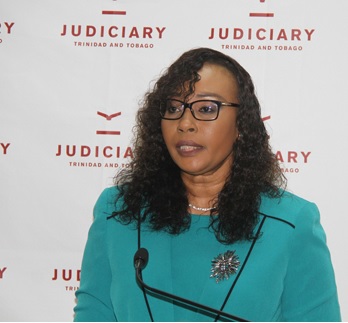(Trinidad Guardian) Judicial crisis! Marcia Mess! Comedy of Errors!
Three descriptions yesterday from three different legal minds on the unfolding scenario involving former chief magistrate Marcia Ayers-Caesar, who resigned Thursday as a High Court judge to return to the magistracy.
There are also opposing views on whether Ayers-Caesar can resume hearing part-heard matters which she left behind when she resigned as chief magistrate.
President of Criminal Bar Association Pamela Elder and Senior Counsel Israel Khan are both saying Ayers-Caesar cannot resume hearing the matters, but former chief justice Michael de La Bastide says he sees no reason why she cannot.
But there are also growing concerns that by the statements he made, Chief Justice Ivor Archie has brought the character of Ayers-Caesar into disrepute.
Less than a month after being appointed as a judge, Ayers-Caesar resigned on Thursday to return to the magistracy. The about turn followed protests by prisoners at the Port-of-Spain Magistrates’ Court on Thursday, after they were told their matters before Ayers-Caesar could possibly be restarted. Some of them have been in prison for the past ten years.
In resigning, Ayers-Caesar apologised for the impact her decision had on the “stakeholders in the criminal justice system including accused persons, victims of crime and members of the legal profession.” She also expressed regret at the effect which her actions “have caused on the very persons whom I strive to serve.”

Archie, in an almost simultaneous statement, said “the Chief Justice and the JLSC were not made aware of the full extent of her obligation before the lower court.” However, the CJ said given her commitment to address her outstanding matters pending her in the Magistrates’ Courts, the JLSC had agreed to “restore Mrs Ayers-Caesar to the Magisterial bench.” He also urged members of the legal profession and other stakeholders in the criminal justice system “to continue to render the support needed to ensure the efficient disposition of matters in the criminal justice system.”
But can Ayers-Caesar simply resume hearing those part heard matters? This is where legal opinion differs.
De la Bastide told the T&T Guardian he did not “see a problem with her resuming the matters which were before her.”
He said: “All of this was a pity, the whole thing is very unfortunate and could have been avoided had it been addressed in advance her appointment.”
He said he would have thought that Ayers-Caesar “would have been required to submit a list of part heard matters and report on the status of each to the JLSC, and she should have been given six months to complete those which were already advanced.”
While he gave her “full marks for taking the action which she did,” he said “it would be a tragedy if all of this was in vain” in light of other legal opinions that Ayers-Caesar may not be able to resume hearing the part heard matters and they will have to be restarted.
Elder described the scenario as “the Marcia Mess,” saying “panic decisions had been made.” She said she was “extremely troubled by the turn of events,” adding she hoped in making his decision the Chief Justice had considered “the concept of functus officio and the resulting consequences.”
She said: “When a magistrate resigns leaving part heard matters the concept of functus officio arises. You resigned, you have no jurisdiction over these matters. What gives you jurisdiction now?”
The unfolding scenario, according to Elder, presented other concerns.
Referring to the CJ’s press release, Elder said “what he is in essence saying is that the Chief Magistrate made material non-disclosure to the JLSC, such a statement goes to the integrity of the person.”
Elder said the statement brings into question: “does this person possess the quality necessary to sit on the bench to resume functions as a magistrate? How will this be perceived by accused persons, would they think she has anger towards them? Would they think that she would just rubber stamp matters and send them to the High Court?”
She said accused persons could well say that Ayers-Caesar abandoned them before and may be had just returned “to rubber stamp matters quickly to go back to the High Court.”
Elder said while some accused persons may simply say “they don’t care because they want their matters continued. But if they are committed they may challenge the committal.”
In Elder’s view, the matters which were before Ayers-Caesar should all to be restarted.




